A master of complex family dramas, with Andrey Zvyagintsev‘s latest we are witness to abandonment and neglect via an intense investigation of the family torn apart by divorce and this is complimented by the backdrops of lifeless dwellings and spaces. Loveless is structured in relation to the emotional bonds between family members – fathers and sons, mothers and their children. The dramatic elements in his body of work proves non-negligible: the family as the intimate unit is usually torn-apart, and the associated suffering is visually expressed with insular thoughts and gestures. With concerns of narcissism developed by the current global culture and its impact on the family structure in Russia, Loveless conveys these miserablist messages with simplicity and delicateness; it avoids the use of over emphasized symbols and finds its uniqueness in finding a right cinematic style. I had the opportunity talk with Zvyagintsev at TIFF and we covered such items as the cinematic and visual inspiration for the film, symbolism and its relation with contemporary society.
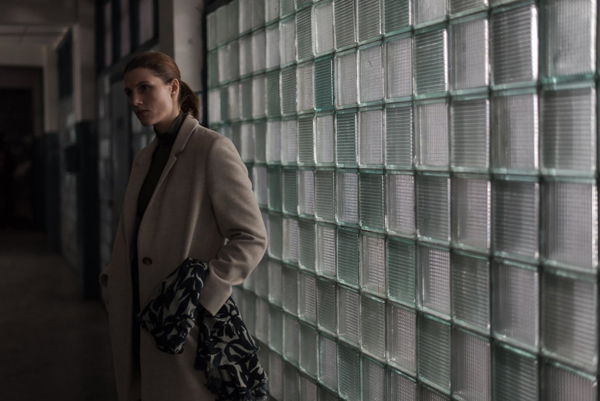
Amir Ganjavie: What I appreciate about your cinema is that your films are very well structured in relation to creating the emotional bonds between family members – fathers and sons, mothers and their children. What is the source of your inspiration for creating these images? Where do these ideas to create this harmony between family members come from?
Andrey Zvyagintsev: People ask me this question quite often. “Aren’t you a film director who shows the same story again and again? In all your stories we see family, we see children, we see this relationship.” I do not really know how to answer because what interests me is the family as this intimate thing where people really open up and takes off all the masks and show their real suffering and problems which are deep inside themselves. This is the most interesting subject for me to explore and what I’m saying to you now is my answer because I have to say something but really I do not have the answer. I do not have a special strategy for making films about family. I just want to present things the way they happen naturally.
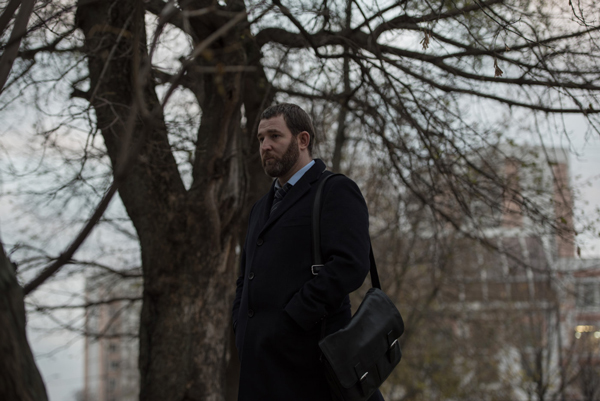
Ganjavie: What about cinematic inspirations? You mentioned at Cannes that you have been inspired by L’Avventura by Antonioni, Hidden by Michael Haneke, and Scenes from a Marriage from Bergman….
Zvyagintsev: Yes, I spoke about that but if you put these two films together then you will see that there is nothing in common between them except that they are about couples who are divorcing. In Bergman’s movie they talked about their children for five hours but the children don’t even appear on the screen. And if we speak about L’Avventura only the viewers told me that there is some sort of direct analogy here because there is a search happening in both films. In Hidden there is the search for the missing boy. The inspiration came not from the direct observation of watching some movies but rather these are the strong feelings that come when something has shaken you up. It’s something that you may be even not be aware of but it’s something that you can actually answer in your film.
Ganjavie: There are several striking sequences in the film, such as the ones involving women in beauty salons. How do you go about inserting these feminine voices into your work?
Zvyagintsev: That’s a really good question. If a woman goes into a beauty parlor and spends four hours there you don’t know what happened inside. It’s a completely closed territory. I believe that my friend Oleg Negin, who wrote the script, isn’t able to go inside of those chambers either. That means what you see in the film is a fantasy. It’s an imagination of something that real women might talk about, like their skin care, their children, and their men. Sometimes when you’re sitting in a coffee shop you listen to ladies talking and hear what they talk about, like shopping.
Ganjavie: I really like the sex scenes involving the female character who also happens to be expecting. You created a lyrical image with shadows which really haunts the audience. Where did the idea for this image come from? Is it from Russian literature?
Zvyagintsev: It’s definitely not Russian. As far as the erotic scene between Anton and Jenny is concerned it was inspired by some photos by a photographer named Annie Leibovitz. She portrays a female body with darkness and shadows so that we could understand that there was some kind of intercourse going on but it wasn’t that obvious. Our camera operator Mikhail Krichman and I resolved these pictures and we thought that it could serve our cause well. Of course, for each scene we talked in very precise detail about it, sitting at the table and trying to interpret it from different points of view and to get into the details and make it as powerful and interesting as possible for the viewers. There were three scenes that I felt quite nervous about – the two sex scenes and the one where the boy is crying silently behind the door. Sex is very difficult to shoot; it’s very difficult to reach this kind of sincerity and to make it true to life. I knew for sure that if it hadn’t been true to life then I would have just cut out the scene.
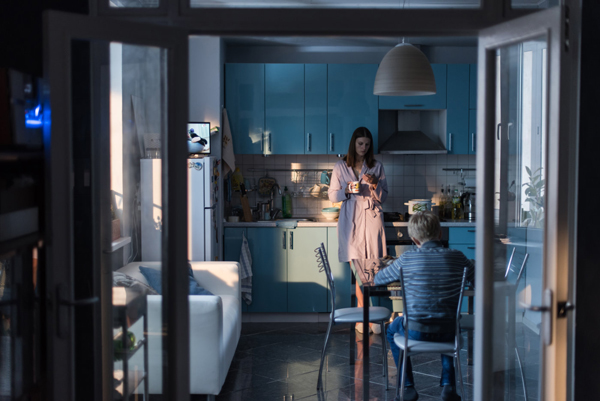
Ganjavie: This brings me to the issue concerning the relationship between you and your performers. Do you let actors improvise or alter the dialogue or scenes?
Zvyagintsev: They usually stick to the script. We have the text and we have the dialogue. It has to be very well pointed out so that they exchange those phrases at a certain speed and achieve a certain result. Each of them knows how it’s phrased but sometimes during the rehearsals, some new lines do appear and one of the actors offers them to us. For example, when the lady is talking about her daughter in the scene with the haircut the last phrase that she said was actually created on the set. It was a bit of an improvisation when Jenya says, “Oh, you have a smart girl” and the stylist added, “She is a copy of me.”
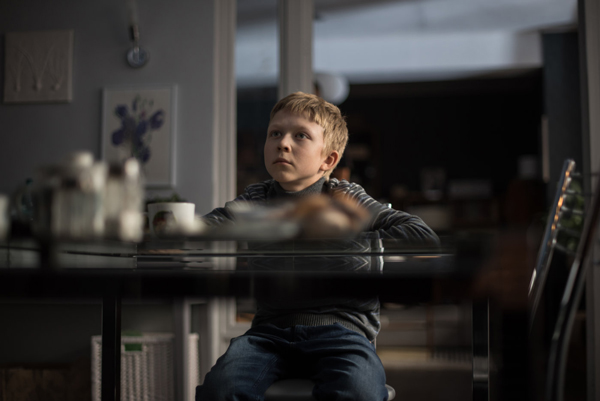
Ganjavie: You usually work with a regular crew, such as your cinematography and editors….
Zvyagintsev: I have known the cameramen, DOP, and costume designer for 17 years. It’s like a family and we understand each other very well. There are no surprises and really know what we are doing. One of the most interesting scenes is the one where we see all of them take a selfie. This is a very interesting shot and there are other beautiful scenes in which you play with selfies. It seems like the movie is criticizing selfies or technology, especially mobile phones.
Ganjavie: Does this film say something about your own take on technology?
Zvyagintsev: No, it’s not. The technology is fantastic. This miracle has appeared to us and now you can be anywhere in the world with the whole world in the palm of your hand. How can you possibly treat it as a negative thing? Only human nature can bring in negative aspects to the technology. It is said that the most beautiful things can become the most horrible if you lose the sense of measure. Selfies are the key to selfishness. People look at their cellphones all the time. They can take pictures of themselves. That’s an important thing. What level are you talking about? Let’s take a selfie, like the girl said in the restaurant.
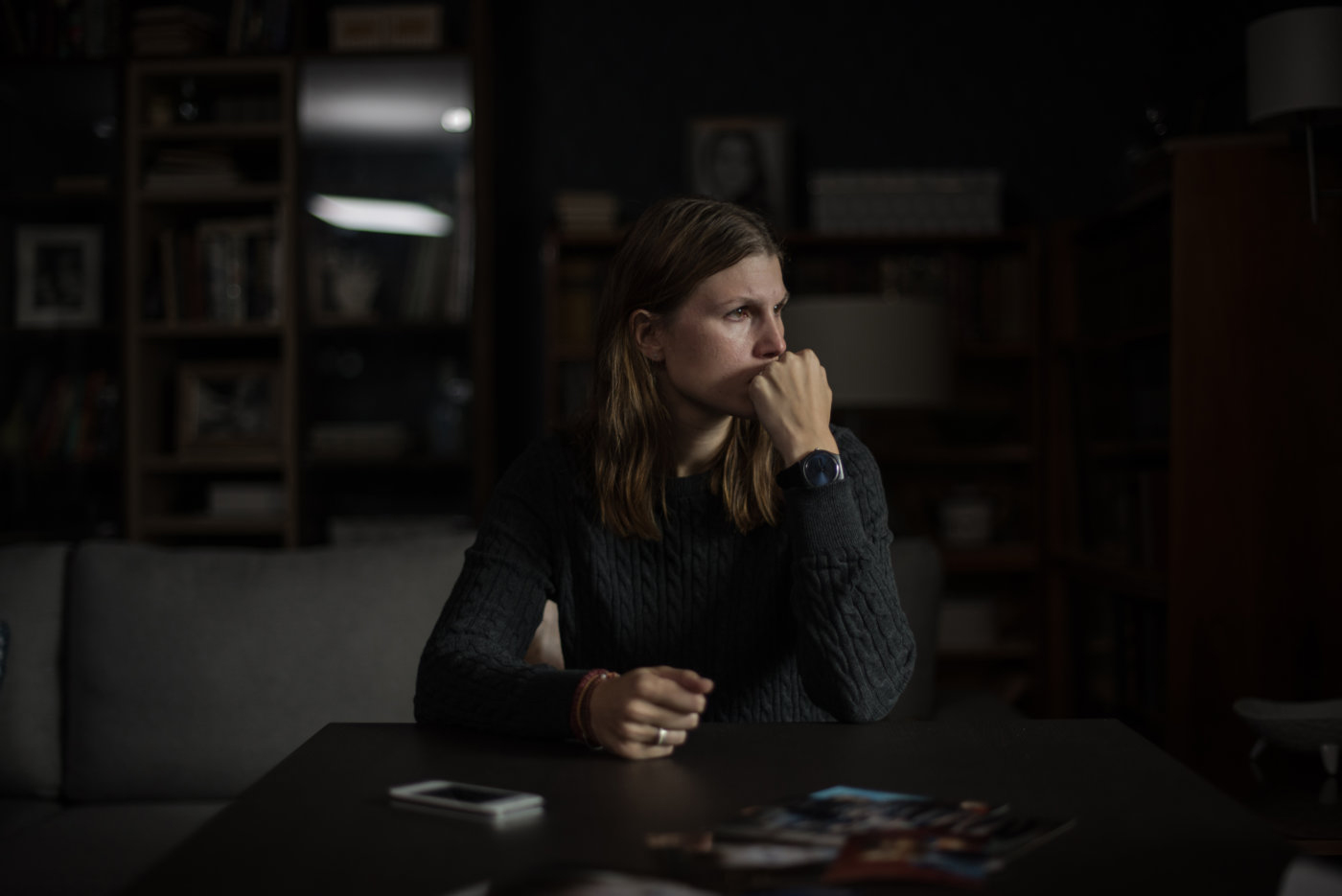
Ganjavie: Could you discuss your casting process – especially Maryana Spivak, who we’ve never seen before. Can you say more about what aspects of her made you include her in this film.
Zvyagintsev: Whenever I start working on a film my dream is to find actors who nobody knows. We spent quite long time looking for the right people because if the actress is 32 or the actor is about 40 and nobody knows them then this is a testimony that maybe they are not that strong. On the other hand maybe they were just not lucky. In connection with that, you have to go through a lot of people in order to find someone new and fresh. In this particular film, Loveless, I think we have succeeded. It was Maryana Spivak’s first film. She’s a theatrical actress and is also in a very low-profile sitcom on television. For an actor in a movie their face says a lot about their character.
Ganjavie: Is this something very important for you in determining whether someone is a good fit for your film?
Zvyagintsev: I’m not concentrating specifically on their faces. We are looking for a new actor, for a talented actor. If you believe in what is happening, then the face is secondary. Our actress is beautiful but maybe I have just fallen in love with her. We look not at the face but at the personality that intertwines with the character she needs to play. There is an argument that this movie is a critique of the Russian government but I don’t think it is there. Instead, I think it is a critique of postmodern society, the globalized world. The images that I see in this movie could happen in any country. I don’t know about globalization but I’m pretty sure that this problem exists in all parts of the world. The reason that we got a lot of positive reviews and a big round of applause after the premiere is that people from various different nations relate to this story and the problems that the characters experience. It must be something that we all have in common and I do not see the story as being exclusive to Russia. It’s understandable for everyone.
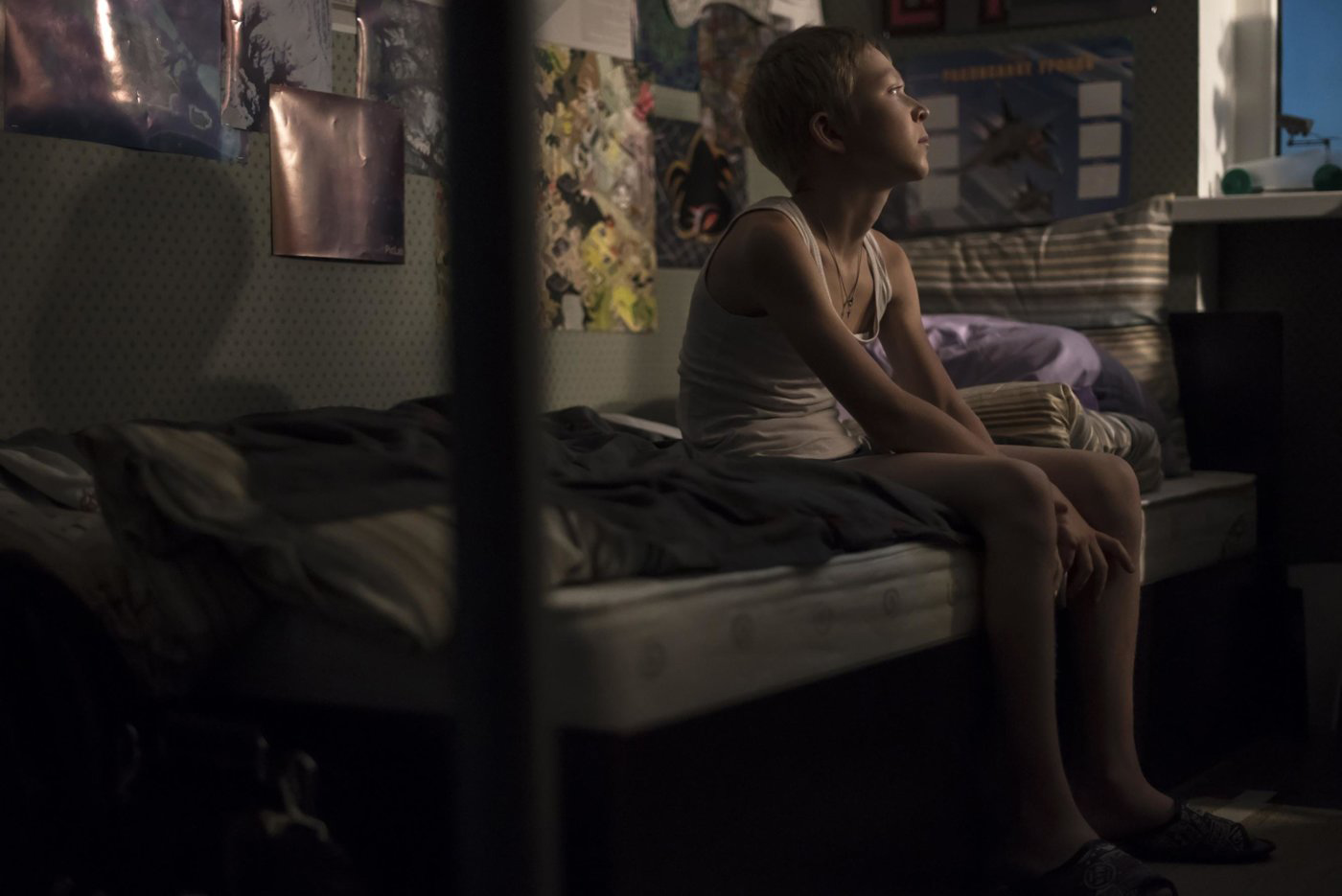
Ganjavie: I like your take on symbolism. There are some images here that seem to say something about your views on political issues, such as the treadmill sequence. You don’t go overboard with the symbolism. How have you tried to bring political issues into the movie without becoming too symbolic?
Zvyagintsev: Thank you. As you have said, we implemented this skillfully and we’re not going overboard with that. I actually didn’t make this film with a political purpose in mind. It’s my tribute to the time. In last scene of the movie, it’s February 2015, which is the time right after the Olympic Games in Sochi. Many people liked these uniforms worn by the Russian Olympic team sports. I love that people liked it. It was cool.
Ganjavie: At your press conference at Cannes you talked about the fact that this story invites us to think about the other and to remind us that we are not just individuals. However, at the same time you criticized religion and the state. How can we create concern for others without entities like religions or states to give a sense of unity to the world? I think this sense of otherness comes with a sense of unity and when there is nothing that could create the sense of unity, how what do you think that otherness is possible?
Zvyagintsev: Of course, the state is supposed to bring people together and unite them but it does not always manage to fulfill its tasks. The same goes for religion when it overwhelms the person and rather than being about the belief in God or some pure kind of worshiping it instead becomes about the belief in letters that are just written by someone. In this case religion is not fulfilling its tasks. When we were auditioning actresses, one of them – not Maryana but the different one – told me that she was reading the script the night before and when she finished reading it and it was already 2:00 in the morning. She rushed into her child’s bedroom and hugged her, asking for forgiveness. I asked her how old her child was and she said about half a year old. This really amazed me because I didn’t think that you can be sorry for something with a child of that age and ask it for forgiveness. However, maybe this actress could foresee that later in life it would become clear that there was some kind of fault on her part. For me this is a wonderful example and an ideal model of what I hope that my movie will make people do. I really hope that it will make them want to call their family members or to hug their children and other things like that.
Ganjavie: You frequently focus the camera on the landscape, sometimes just a couple of minutes with music while nothing happens. This reminds me of the end of Antonioni’s The Night, which is just landscapes. How do you think about the relationship between architecture and landscape and your work?
Zvyagintsev: I think we have enough time to look around and look for the right landscape. You see those landscapes that we have in the movie, that beautiful space, for example, where the boy goes. Thank God that we had enough time to go and look through those landscapes when choosing them.
Ganjavie: And concerning the film’s score, which includes some modern classical music. Where did you find these pieces?
Zvyagintsev: This music was written specifically for the film by Arvo Part, a guy who we met in Paris one evening and afterwards he said that he wanted to work with me. He sent me four or five of his tracks but I didn’t feel any connection with his music and I couldn’t answer him for several days because I was very much into the shooting. I was very busy and I think he got very, very angry so he just sat down and created some new, very powerful music and sent it to me again. This time when I heard it I was really fascinated and I asked him to write music for the movie but I didn’t tell him anything about the script. He didn’t know the story but I just told him to write some music from his heart, something very powerful, and he managed to do that.
Sony Pictures Classics released Loveless in theatres this month.


